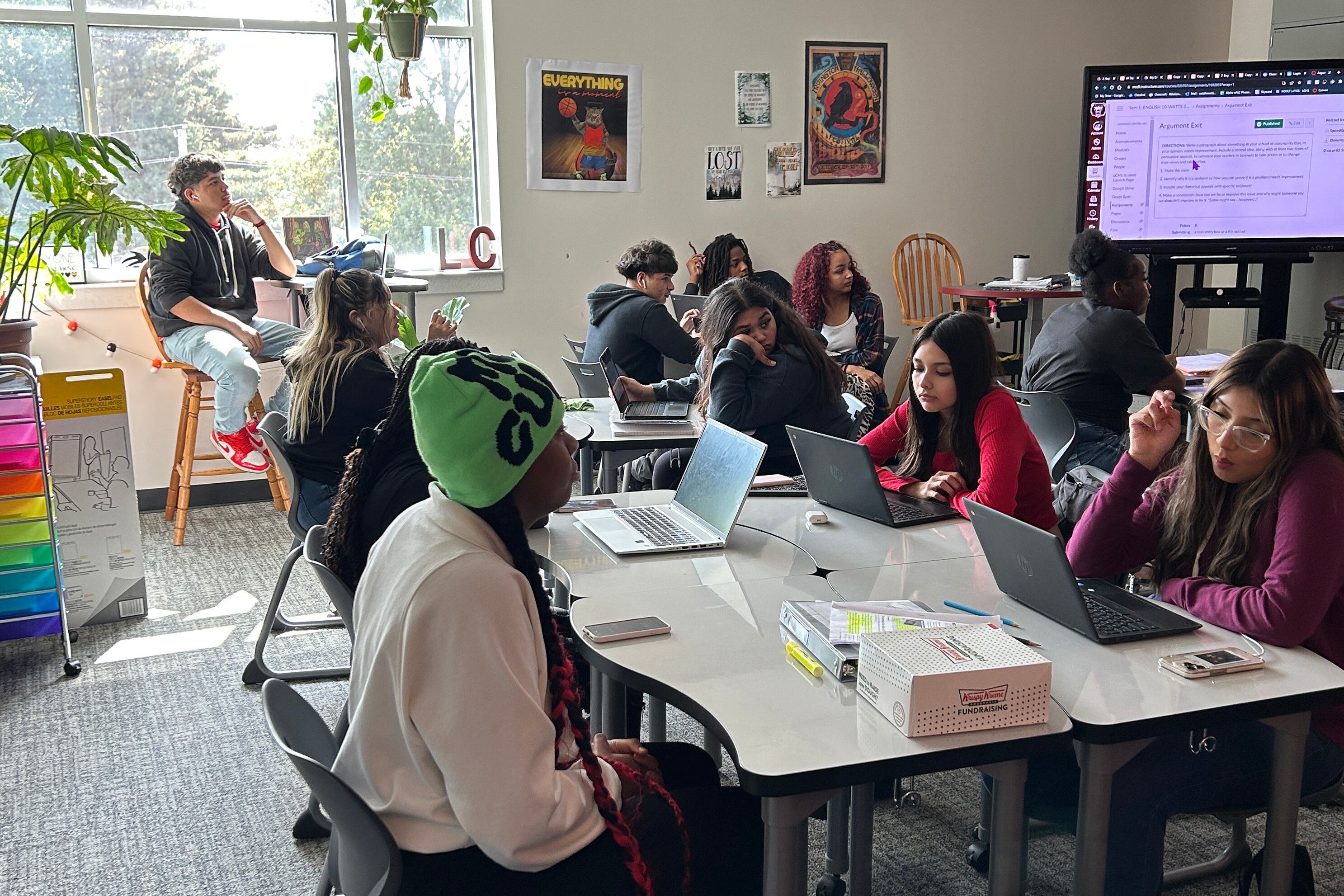Sign up for Chalkbeat Indiana’s free daily newsletter to keep up with Indianapolis Public Schools, Marion County’s township districts, and statewide education news.
The Metropolitan School District of Lawrence Township will give its roughly 1,000 teachers a 4.5% raise for the current school year following contract negotiations that renewed scrutiny of the difference between teacher and administrator pay and became part of school board election endorsements.
The school board unanimously voted on Monday to bump the starting salary to $52,250 for teachers, but remained divided on increases for administrators with a 3-2 vote to approve.
Administrators will receive a 3.5% raise, but department chairs, who also teach, will receive the 4.5% increase.
The teachers’ contract also adds a $2,000 stipend for bilingual teachers. The district will also increase its contribution to a 401a retirement plan by up to 3.75% of a teacher’s salary with an additional 0.25% match if enrollment increases by at least 50 students in February. Teachers will also see a 0.5% increase in the district’s contribution to the state Teacher’s Retirement Fund.
Administrators and teachers will see a 10% increase to their current monthly health insurance premiums. The district will also pay a 10% increase in its health care contributions. The district plans to tap $3 million of its cash reserves to address rising health care costs, $2 million of which is attributable to teachers.
Board members Jessica Dunn and Marta Lawrence, who have voiced concern with the amount administrators are paid in the district compared to other districts, voted against the administrator raises.
The ongoing disagreement between Dunn and Lawrence and the remaining three-member board majority spilled into the election for the only contested school board seat this month.
While board president Wendy Muston and board member Amy Norman supported their incumbent colleague Crystal Puckett for the at-large seat, Dunn and Lawrence endorsed her opponent, Eric Young.
Puckett won with roughly 65% of the vote, according to unofficial election results.
Chalkbeat Indiana reached out to the Lawrence Education Association for comment. The local teachers union previously declined to comment on administrative salaries and did not make an endorsement in the most recent school board election. But its leaders say the topic of administrative pay tends to surface during contract negotiations, noting the heightened awareness of education funding ahead of the November election.
Lawrence clarified before the vote Monday that she would have voted to approve a 4.5% raise for department chairs if they were separated from other administrators such as principals, cabinet members, and directors.
She pointed to her own analysis of publicly available salary data, noting that the top 25 highest-earning employees in the district make more than those in nearby districts. Salary data reported on the state’s Gateway platform shows the district’s top 25 earners make at least 28% more than those in other districts such as Pike, Wayne, and Warren townships and the city district of Carmel Clay Schools.
“I have difficulty rationalizing an increase of 3.5% in administrators’ salaries when those administrators also make substantially more than many of their peers in other districts,” she said at a public hearing on the contracts on Nov. 4.
The extra pay under scrutiny stems in part from a variety of other benefits that the district offers to certain types of administrators, which are separated into two groups for health insurance benefits.
Cabinet members, directors, and principals receive a monthly allowance for health insurance, which they must pay for on their own. These administrators do not have to use this stipend toward health insurance, however. In addition to 401a retirement contributions, this group also receives a contribution to a 457 retirement plan.
Other administrators — including assistant principals, assistant directors, athletic directors, and department chairs — receive a health insurance contribution instead of an allowance and do not receive a 457 retirement contribution.
Muston supported the raises for both teachers and administrators, praising the district for its financial management.
“With increased responsibilities come increased benefits, and I appreciate every single teacher in this district, every classified employee and every administrator, and every team lead,” she said on Monday. “Our administrators are given budgets to manage, and it’s largely because of the work of our administrators that we have this budget to work with.”
Superintendent Shawn Smith, whose salary Lawrence and Dunn have also voiced concerns over, can receive the same pay raises as teachers each year, according to his contract.
But Muston said that Smith has requested the lower administrative raise of 3.5% instead. That would bring his base salary to roughly $262,000, according to existing salary data on the state’s Gateway platform.
Classified staff, which include positions that do not require a certification of some sort, will also receive a 4.5% raise.
Amelia Pak-Harvey covers Indianapolis and Lawrence Township schools for Chalkbeat Indiana. Contact Amelia at apak-harvey@chalkbeat.org





